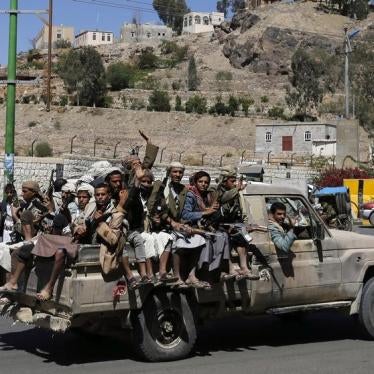(Sanaa) – Yemen’s government has not followed up on promises to take decisive measures to ensure justice for past human rights violations, Human Rights Watch said today in its World Report 2015. The government should also pass legislation to end child marriage and female genital mutilation, and reform laws that discriminate against women.
President Abdu Rabu Mansour Hadi and his cabinet resigned on January 22, 2015, after Houthi insurgents took over de facto control of the capital, Sanaa, but parliament has not yet accepted their resignation.
Hadi has not acted to hold former President Ali Abdullah Saleh, in power for 33 years, and his aides, accountable for their crimes. They were granted immunity from prosecution by Yemen’s parliament in 2012. Hadi had promised to pass a transitional justice law, appoint a commission of inquiry into government abuses during the 2011 uprising, and create other mechanisms to provide accountability for past violations or prevent future ones.
“The Yemeni government has ignored people’s calls for justice for the widespread and serious rights violations under Saleh’s rule,” said Joe Stork, deputy Middle East and North Africa director. “The government should heed those calls, break from the long practice of indifference to abuse, and ensure accountability.”
In the 656-page world report, its 25th edition, Human Rights Watch reviews human rights practices in more than 90 countries. In his introductory essay, Executive Director Kenneth Roth urges governments to recognize that human rights offer an effective moral guide in turbulent times, and that violating rights can spark or aggravate serious security challenges. The short-term gains of undermining core values of freedom and non-discrimination are rarely worth the long-term price.
A 10-month process of national dialogue that ended in January 2014 produced hundreds of recommendations for legal and other reforms, including calls for the creation of a national human rights institution and the adoption of a transitional justice law to address accountability for past human rights abuses. Yet, by the end of the year the government had taken no significant steps to promote accountability, or other national dialogue recommendations on women’s equality, non-discrimination, and violence against women. A committee appointed to draft a new constitution began working in April but had yet to publish a draft by year’s end. A draft children rights law submitted to the cabinet in April – which would ban child marriage and female genital mutilation – had not been approved.
There was considerable fighting across Yemen in 2014. In May in the south, government forces opened a military offensive against the Islamist armed group Al-Qaeda in the Arabian Peninsula (AQAP). In the north, the military clashed with fighters belonging to Ansar Allah, the northern-based Shia Houthi movement, which seized control of Yemen’s capital, Sanaa, in September. The US continued its drone campaign against alleged AQAP members and remained unwilling to publish basic information on the attacks.
The fighting across the country resulted in attacks on civilians and schools and hospitals in violation of international law. State forces and rebel groups damaged or destroyed at least 41 schools and occupied at least six others. More than 30 other schools were closed because they were being used to shelter families who had fled fighting near their homes.







